#elgar
Explore tagged Tumblr posts
Text
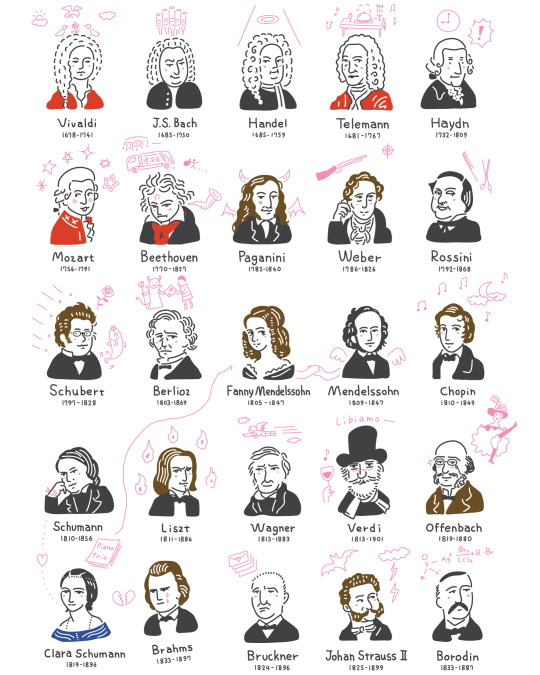

50 composers
#bach#mozart#beethoven#haydn#handel#paganini#schubert#mendelssohn#chopin#schumann#liszt#brahms#strauss#tchaikovsky#dvorak#elgar#mahler#debussy#rachmaninoff#stravinsky#ravel#gershwin#shostakovich#bernsterin
799 notes
·
View notes
Text
The bed situation
994 words | The black prince [WT] (kinda in parallel to Visitors, sorry this series is such a mess lol)
Content | Anxiety, past non-con
Notes | Elgar and Orafin comforting each other... or are they?
Taglist | @echo-goes-aaa @whump-blog @scoundrelwithboba @whumpcreations @neverthelass
@whumplr-reader @vampiresprite @pleasestaywithmedarling

When they reached House Borrim, Elgar was assigned his own bedroom.
It was a strange feeling, standing in there that first night, the door closed behind him, the luxurious bed empty, only waiting for him. He couldn’t quite believe it — that this was his, that he would be undisturbed, left alone.
He had never had a room to himself. He had been locked up alone before, but those occasions just left him waiting for his master to burst in at any moment. And before that, when he was free — if he had a real room to sleep in, he had always had to share it, never able to afford one to himself.
Now he was alone in this big room with the beautiful curtains before the large windows, the painted wardrobe and the desk he had no use for, unable as he was to write, and the bed.
There was a key in the lock. He hadn’t dared turn it.
He couldn’t quite believe it.
The next morning, he appeared at breakfast like he had been told to, and found a prince that looked more tired than he had for the past weeks. As if he had barely slept.
Neither had Elgar. His mind kept playing tricks at him that someone was coming through the door into the room where he lay alone and unprotected, that someone would-
Maybe even the prince.
But of course that was ridiculous.
The prince attempted a smile when he saw Elgar, but it was clear he struggled as much as Elgar struggled to return it.
The prince’s brother — Otira — had welcomed them at the estate and made sure they were settling in, and the prince — Elgar’s prince — wrote a note for him to read to Elgar.
He permitted Elgar to visit him in his bedroom, if he wanted.
When Elgar lay awake again that night, it started feeling like being alone might be worse.
Of course, there was nothing bad about being with the prince at all. He had never tried to hurt Elgar. But with all the power he had now gotten back-
Elgar’s heart was in his throat as he knocked on the prince’s door. A soft squeak answered him, and Elgar felt a brief but intense wave of embarrassment wash over him that he could have forgotten the prince couldn’t answer with a word.
He entered. The prince sat up in his bed, and smiled when he saw him; immediately, he moved over and gestured at the spot beside himself.
»Thank you,« Elgar muttered and slipped under the prince’s covers.
It took him a long time to fall asleep, but eventually, he slept a little better that night.
As the nights crept by, he should have gotten used to it. Should have blindly believed that things would continue the way they were, with the prince next to him chastely holding his hand, or at most lying against his body, perhaps with one’s arm wrapped around the other.
It was comforting, too. It was better than sleeping alone had been. No one could reach him there, in the prince’s bed.
No one, but the prince himself.
He might change his mind at a moment’s notice.
There was no reason Elgar should assume he would, but the thought wouldn’t leave his head. The prince was getting better, more confident and more comfortable in the position that had been his since birth, by the day. Sometimes a simple look or word made Elgar’s anxiety spike so much it took his breath away.
He wouldn’t be able to conceal it forever, and truly, he didn’t want to live like this, not when he had a choice.
For the first time in so long, he had a choice.
Not an easy one. But he had to know.
* »Do you want to sleep with me?«
Elgar’s voice was so small, his eyes so fearful, that Orafin instantly knew what he was getting at, and once more his heart broke for the man who had reached out in kindness in his darkest hours. Both their darkest hours, really. The thought that he who had saved him would now fear Orafin would take advantage of his position to dig deeper into the horrific hurt he had been subjected to was unbearable.
Orafin blinked back tears — it wasn’t his place to cry, here — and decisively shook his head, seeking Elgar’s eyes. He reached out and took Elgar’s hand into his, squeezed it gently.
Elgar looked up at that. His fear wasn’t quenched, Orafin could tell, and he had to pull back to try and speak.
He didn’t have all the words to say what he needed to say yet, but for all its faults — mostly being so easily talked over, and Orafin having to learn a whole new way of communication well into adulthood—he had found sign language to be quite expressive, and it was easy to convey his intention by speaking soft and gently, like handling a small, frightened animal. »Calm down. I will never, never hurt you.«
Elgar nodded, and swallowed, and then tears slipped down his cheeks.
In truth, Orafin had been impressed with how well Elgar seemed to be handling himself. He, Orafin, had cried multiple times despite his best efforts, but Elgar…
Not until now.
Orafin reached out a hand and, very carefully, took Elgar’s. Squeezed. Only when Elgar squeezed back, Orafin, very carefully, wrapped his other arm around his shoulders.
He was relieved to find Elgar leaning into his touch.
»I’m sorry,« Elgar sobbed as Orafin, very carefully, pulled him into a full embrace. »I believe you.«
It’s okay, Orafin wanted to say. I’ve cried into your shoulder plenty. I know it’s hard. I just want you to feel safe.
But he would have had to let go for that, if he even had the words, so instead, he just held Elgar tighter and let him cry.
They slept arm in arm, and woke up well rested.
#whump#whump writing#comfort#my writing#orafin#elgar#the black prince is a tag that apparently already exists
21 notes
·
View notes
Text

#polls#movies#elgar: portrait of a composer#elgar portrait of a composer#elgar#portrait of a composer#60s movies#ken russell#huw wheldon#peter brett#rowena gregory#george mcgrath#requested#have you seen this movie poll
14 notes
·
View notes
Text
My IDW Sonic Fancast Part 3:

I've had some rethinking about Surge and Jewel since I began rewatching Sailor Moon. But there are plenty of others I didn't cover before.
So... here we go:
"D.C. Douglas as Clutch The Opossum” - As a shady business man with a mug that just screams, "I'm bad news," a smooth and calm voice like that of Yoshikage Kira would be perfect. A cadence that would get people to let down their guard with him since he seems mean but sounds so refined. But like Yoshikage Kira, his dapper facade belies a heart of depravity.
Example:
youtube
“Michael Sorich as Nite The Owl” - While a live action role inspired me, Sorich’s performance as Woody in VR Troopers made me think of Nite. He’d be able to capture his jovial demeanor and would work brilliantly with the mounting horror of the Metal Virus in terms of mood shifts in the story.
Example:
youtube
“Amanda Celine Miller/Bennet Abara as Surge The Tenrec” - In Sailor Moon, Makoto Kino was kicked out of her school for defending others against bullies and is seen as a sukeban (delinquent girl) only for Usagi to find she’s good hearted. Amanda Celine Miller was a fan of the character and it shows in her performance as Sailor Jupiter’s new voice actress.
How would this shake out for Surge? Well, for me, I think Amanda’s smooth yet tough tone as Mako would lend itself well for the Tenrec when she’s unapologetically villainous. As if Mako really was the bad girl she was seen as.
However, in the event of Surge turning herself around, Amanda’s performance would be able to mellow out into something still Surge-y but also able to come off more heroic. A real punk if you will.
Examples:
youtube
youtube
“Derek Stephan Prince as Rough and Tumble” - Two for the price of one. Derek's voice for Impmon would fit Rough with his fast talking New Yorker voice. Given it's a Joe Pesci impression, it'd be a good callback to the wet bandits. Badabing-badaboom.
youtube
Meanwhile, the voice of Elgar from Power Rangers Turbo would be a perfect fit for the more slow-witted Tumble.
youtube
"Stephanie Sheh as Jewel The Beetle" - I feel like Sheh's performance as the ditzy Usagi Tsukino would transfer well into Jewel's neurotic sense of order as well as how she can get anxious pretty quick. Give it a bit of a nasally quality and it'd fit perfectly.
youtube
And that's that. Feel free to voice your agreements or disagreements.
#idw sonic#idw publishing#voice acting#fancast#voice casting#voice cast#sailor moon#pretty guardian sailor moon#sailor jupiter#makoto kino#usagi tsukino#impmon#sonic the hedgehog#sonic the hedghog fancast#idw sonic the hedgehog#jewel the beetle#rough and tumble#surge the tenrec#nite the owl#nite owl#clutch the opossum#clutch#kira yoshikage#derek stephan prince#stephanie sheh#amanda celine miller#d.c. douglas#michael sorich#vr troopers#elgar
10 notes
·
View notes
Text
Pomp and Circumstance (No. 1) is a piece dedicated to Wellington (Essay)
youtube
Pomp and Circumstance: Sir Georg Solti
After I wrote this on YouTube, I received some opposing opinions. I haven't read it in detail, but that's probably the case. When I looked it up, I found that the title was taken from Shakespeare's "Othello." However, isn't the heroism of this piece fitting for the hero of a generation: Wellington?
Composer Elgar wrote this piece before WWI when Britain was in the final glory of Pax Britannica. Elgar undoubtedly had Wellington, who created Pax Britannica, in mind.
During WWII, there was Alan Turing, a mathematician who decoded the German Enigma code and contributed to Britain's victory over Germany. He should be called a hero, but he was not alive when the song was written.
There may have been other people in Britain who could be called heroes, but Wellington is the one who shines the most throughout history. Although this song is not dedicated to him in musical history, in my heart, Pomp and Circumstance is a song that praises Wellington.
Rei Morishita
2024.12.14
威風堂堂(第1番)は、ウェリントンに捧げられた曲である(エッセイ)
威風堂堂:Sir Georg Solti
このようにYou Tubeで書いたところ、反対意見が送られてきた。私はそれを細かく読んでいないが、たぶんそうなのだろう。調べてみると、シェークス��アの「オセロ」から題名が取られている。だが、この曲の勇壮さは、一代の英雄:ウェリントンに相応しいものではないか。
作曲家のエルガーがこの曲を書いたのはWW1以前、イギリスがパックス・ブリタニカの最後の栄光にあった頃だ。そのパックス・ブリタニカを作ったウェリントンを、エルガーが頭に置いてなかったことはあるまい。
WW2時には、ドイツの暗号エニグマを解読し、ドイツに対するイギリスの勝利に貢献した数学者:アラン・チューリングもいて、英雄と呼ぶべきだが、曲が書かれたころにはまだこの世にいなかった。
イギリスには、他にも英雄と呼べる人はいたであろうが、その歴史を通して随一の輝きを放つのがウェリントンである。音楽史的にはこの曲が彼に捧げられたものではないにせよ、私の心の内では威風堂堂は、ウェリントンを称える曲なのである。
2 notes
·
View notes
Text
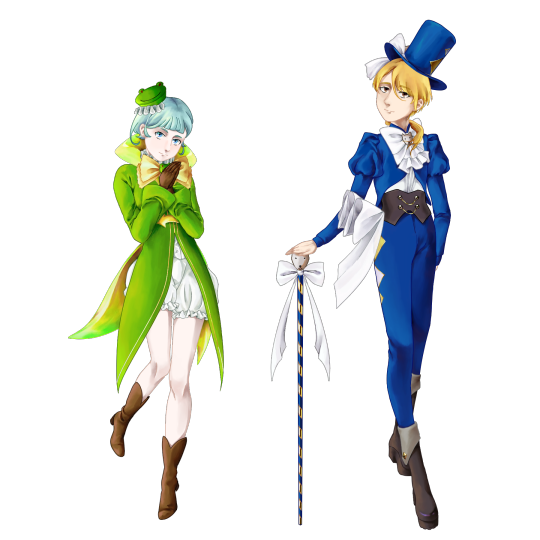

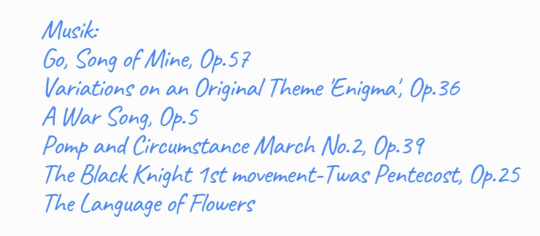
Grieg&Elgar's Musiks. They're a teenage idol group managed by Handel (who is said to be Bach's old friend), competitors of ClaKla but they are privately friends.


The cane of Elgar releases Musiks by touching the ground with. The number of touches, frequency, and amount of force applied (tapping or hitting) determines the Musik that is going to be released.
9 notes
·
View notes
Text
youtube
3 notes
·
View notes
Text
The tutors
909 words | The black prince [WT] (sequel to Lessons)
Content | Just. Anxiety, power imbalance
Notes | Elgar and the royals meet their language tutors!
There's not much in this episode but I'm happy to return to their story c: I actually wrote a much tastier bit too but alas it's from the next arc and I have as yet provided 0 of the context it needs lol. Soon (maybe)
Taglist | @echo-goes-aaa @whump-blog @scoundrelwithboba @whumpcreations @neverthelass
@whumplr-reader @vampiresprite @pleasestaywithmedarling

After a few more days of travel, ever further upwards, they reached the mountain pass they had been aiming towards. It was late in the morning, and they hoped to descend from the coldest heights before nightfall.
But for now, a large valley lay draped before them, and, many miles away, upon the river meandering through it, the largest city Elgar had yet seen in Ochuria sat in it.
»Atcill!« the princess pointed out for him, and rubbed her brother across the back. »Almost home.«
At midday, they stopped at a camp they had been expected at; a handful of tents, only one fancy enough to host the prince and princess.
And from it, another Teeradian emerged.
She was dressed in fine Ochurian garb — much like him, Elgar realized a moment too late; it was easy to forget how fancy he must look now — and followed by a much younger Ochurian woman in much simpler clothes.
Both bowed to the royals, but the princess immediately hopped of her horse and hugged the Teeradian.
»Lady Hirias! Glad you could make the journey!« She spoke Teeradian, whether for the stranger’s benefit or his, Elgar wasn’t sure.
The prince next to Elgar dismounted, too, smiling and nodding at the woman; Elgar hurriedly followed.
She was awkwardly returning the princess’ hug, but her eyes were sharp, and they quickly settled on Elgar. Only when the princess let go, she turned her attention back to the royals.
»I am pleased you are well, your Highnesses.« Brief worry flickered across her face as she looked at Orafin, but he was still smiling, and she continued without comment, »This is Zizariu. State your purpose, girl.«
»I am — I am going to teach you how to sign, your Highness, if you’ll have me.« The young woman’s voice trembled a little, and her eyes were darting anxiously between the ground and the prince’s face; it was obvious she was not used to speaking to royalty.
But she was moving her hands as she spoke to demonstrate, fluidly and effortlessly.
»Her mother is deaf,« Lady Hirias explained bluntly. »She serves in the palace; a chef, I believe.«
Zizariu nodded, clearly still a little breathless from the company she was in.
»Thank you.« The princess smiled at her. »Your services — and your mother’s, I’ll say — are much appreciated.«
»Your Highness.«
»And this is Elgar.« The princess gestured at him far more dramatically than Elgar would have liked.
»I figured,« Lady Hirias said, raising an eyebrow and examining him head to toe. Elgar felt like sinking into the ground from the attention. »I hope you’re a bit quicker on the uptake than his Highness here.«
Only the slightest shadow of a smile gave away the playfulness of her tease. Orafin, though, just rolled his eyes and gave Elgar a pat on the arm.
»Lady Hirias will be teaching you Ochurian from here on out,« the princess said with a warm smile; surely his concern must be showing on his face.
»Yes, I — I figured that,« he replied weakly. »Milady,« he added quickly. The etiquette lessons the royals had been imparting on him felt an impossible bar to cross, far too many little rules to ever remember them all, but he could remember stuff like this — things that made some shadow of sense.
She cocked her head, and Elgar immediately realized she could hear, unlike the Ochurians, how lowly and peasant he sounded.
But she said nothing.
The princess chattered on as lunch was readied for them — still three meals every day, and still Elgar felt like it was a dream — and answered the burning question he didn’t dare ask.
»Lady Hirias has joined the intelligence corps when she came here, and now she’s retired, she’s teaching instead. She has rendered this country a great deal of service — kind of like you,« she added in what could only be a joke.
But something in Elgar’s mind clicked at the story. »You’re — you’re Lady Sirvi Hirias. You disappeared…«
Lady Hirias raised an eyebrow. »For a street urchin, you must have been paying close attention to court gossip.«
He hadn’t; everyone had heard of the lady’s disappearance and presumed death. The words burst out before he could stop himself. »You’re a traitor!«
Lady Hirias kept a straight face. »Kind of like you.«
Elgar was already in the process of trying to melt out of sight from the sudden bout of unexpected boldness, and now he had to reckon with being called a traitor.
Maybe he was. But Teeradia had never done much for him. The Ochurian royal family, on the other hand-
Lady Hirias nodded at him, pleased. »You see what I mean.«
The prince curiously looked back and forth between them, and Elgar wasn’t sure how to begin explaining. But then the prince just took his hand, squeezing it; he must have sensed his discomfort; and suddenly Elgar felt silly. It was nothing. What did it matter to him whether the lady had been loyal to the government of a country he had long since left behind?
What mattered was whether his efforts in her lessons would be appreciated, and he just had made it that much harder for himself. »I’m sorry,« he muttered, but of course it was too late.
Lady Hirias’ sharp eyes rested on him a moment longer, then she turned away, and the little smile he thought he caught in the corner of her mouth did not bode well.
#whump#whump writing#my writing#the black prince is a tag that apparently already exists#elgar#orina#orafin#zizariu#hirias
20 notes
·
View notes
Text

OTD in Music History: Composer and conductor Edward Elgar (1857 - 1934) is born in England. Although Elgar is often regarded as a prototypically “English” composer, most of his musical influences were not from England, but rather from continental Europe -- i.e., Johannes Brahms (1833 - 1897), Antonin Dvorak (1841 - 1904), and Richard Strauss (1864 - 1949). Furthermore, in many ways, Elgar actually felt himself to be an outsider in British society. In musical circles dominated by academics, he was a self-taught composer; in Protestant Britain, his Roman Catholicism was regarded with suspicion in some quarters; and in the highly class-conscious society of the Victorian and Edwardian Eras, he always remained acutely aware of his own humble origins (even after he achieved an international artistic reputation and secured financial independence). Among Elgar's best-known compositions are the "Enigma Variations", the "Pomp and Circumstance" marches, concertos for violin and cello, and two symphonies. He also composed a number of large-scale choral works (most famously the "The Dream of Gerontius"), as well as a wide array of chamber music and songs. He was appointed to the prestigious position of "Master of the King's Musick" in 1924. Views of Elgar's proper stature in the world of "classical" music have varied widely in the decades since he first rose to prominence at the beginning of the 20th Century. Famed conductors like Hans Richter (1843 - 1916) and Arthur Nikisch (1855 - 1922) both rated him very highly; by contrast, however, Herbert von Karajan (1908 - 1989) summarily dismissed his "Enigma Variations" as "second-hand Brahms"... PICTURED: A c. 1910s real photo postcard showing the middle-aged Elgar seated in a formal pose.
#classical music#music history#opera#bel canto#composer#classical composer#aria#classical studies#Edward Elgar#Elgar#Symphony#Romance#Intermezzo#chamber#orchestra#Sonata#Serenade#Sea Pictures#concert#concerto#Speak Music !#classical history#opera history#classical musician#musicians#music#musician#chest voice#historian of music#Dream Children
4 notes
·
View notes
Photo
Without a doubt, my favourite film. Haunting, haunted, resonant. The music of Elgar echoes through the Malvern landscape, awakening a boy’s consciousness and sexuality - and manifests the ghost of Penda, the last Pagan King in England.
“Be secret. Child, be Strange. Dark, True, Impure, and Dissonant.”

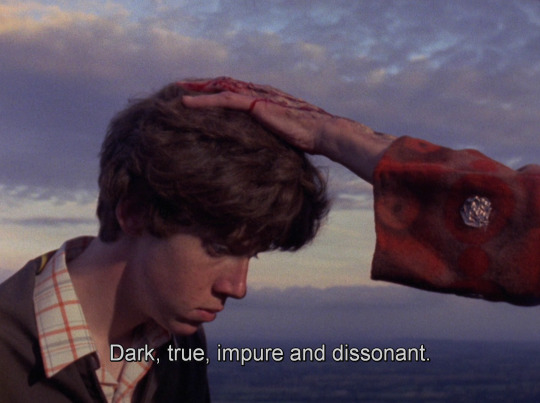
Penda’s Fen (1974) | dir. Alan Clarke
10K notes
·
View notes
Photo

Gülsin Onay & Erkin Onay
Bilkent Konser Salonu 23 Mayıs 2024 Perşembe, 20:00
Elgar | Sonat op.82
Elgar | İzmir'de
Bartók | 7 Eskiz
Saygun | Aksak Tartılar Üzerine
Saygun | Demet
2 notes
·
View notes
Photo
Penda's Fen is one of the most haunting and haunted films I have ever seen. The music of Elgar echoes through the Malvern hills, awakening both the emergent sexuality of a young man, and the spirit of Penda, the last Pagan King of Mercia.
Be secret. Child, be strange. Dark, True, Impure, and Dissonant.
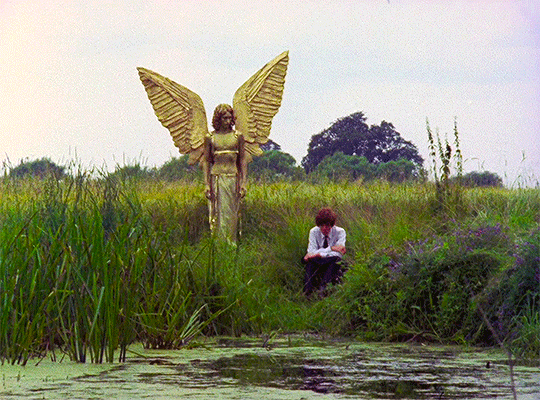

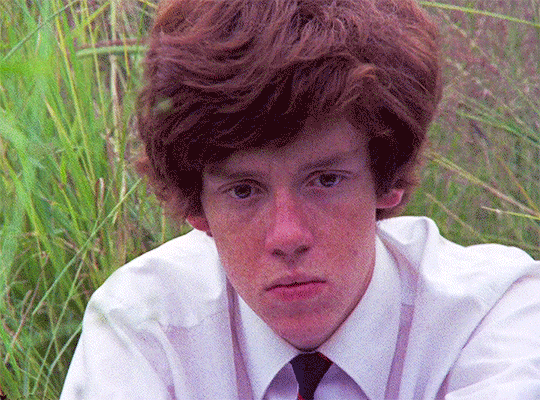
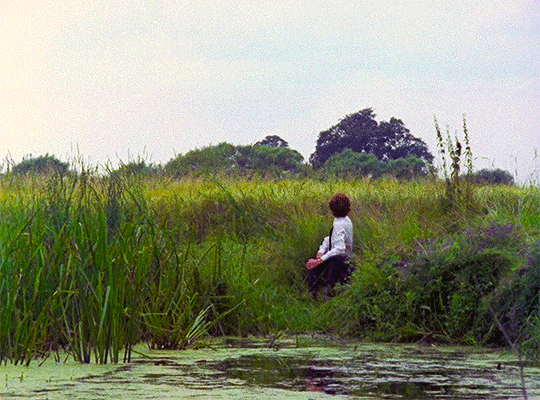
Penda’s Fen (1974) dir. Alan Clarke
2K notes
·
View notes
Text
Salut d'amour(Greetings of Love ):Elgar Classic
A woman sighed, "Why do men like the song 'Pomp and circumstance'?" I feel like I understand. It's often used in boxing title fights to honor the winner. It's probably a song that men like. On the other hand, in the case of “Salut d'amour ”, she will accept the orthodox love song. Episodes of two of Elgar's masterpieces. But as a man, I prefer Pomp and circumstance.
愛の挨拶(エルガー) クラシック
「なんで男のひとは、”威風堂堂”なんて曲が好きなの?」と嘆息した女性がいた。わからんでもない。ボクシングのタイトルマッチで、勝者を称えるときによく使われるし。男性好みの曲ではあろう。いっぽう”愛の挨拶”の場合、正統的なラブソング、その彼女も受け入れるだろう。エルガーの代表作2曲のエピソード。でも、男の私は、「威風堂堂」のほうをより好む。
#Salut d'amour#Greetings of Love#Babylman#Elgar#Classic#Pomp and circumstance#boxing#orthodox love song
5 notes
·
View notes
Text
additional setting


Grieg& Elgar's group symbol

2 notes
·
View notes
Text
Festspielhaus Baden-Baden - Sol Gabetta e Mikko Franck
Foto ©Andrea Kremper L’ Orchestre Philharmonique de Radio France sta effettuando in questi giorni una tournée europea sotto la guida di Mikko Franck, Continue reading Festspielhaus Baden-Baden – Sol Gabetta e Mikko Franck

View On WordPress
#baden baden#berlioz#critica#elgar#franck#mikko franck#novecento#orchestre philarmonique de radio france#sinfonica#sol gabetta#strumentale#violoncello
0 notes